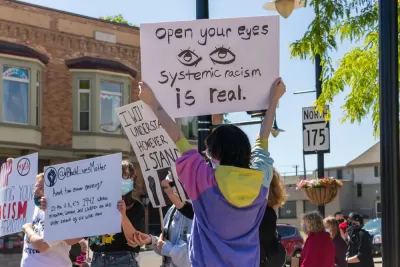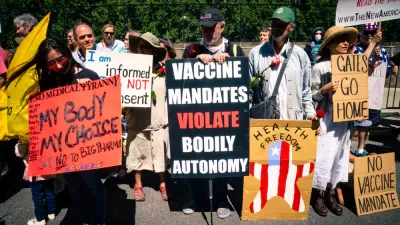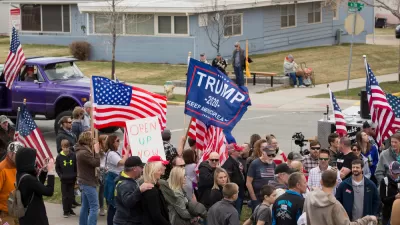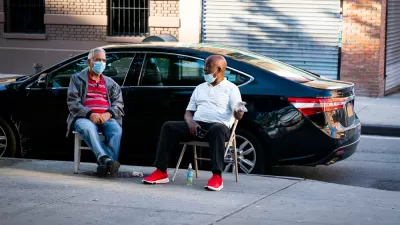New research from the Brookings Institution illuminates the racial disparities of public health outcomes both during and before the pandemic.

An article for the Brookings Institution, written by Andre M. Perry, Carl Romer, and Anthony Barr, digs into the poor life expectancy of Black Americans—public health outcomes connected to environmental injustices in predominantly Black communities.
The first paragraph of the article succinctly summarizes the disparities in the health impacts of the Covid-19 pandemic:
Earlier this year, the National Center for Health Statistics (NCHS) published data showing a 1.5-year decline in national life expectancy in 2020, largely due to the COVID-19 pandemic, which took the lives of approximately 375,000 Americans that year. The NCHS reported that white Americans’ life expectancy declined by 1.2 years; for Black Americans, that number was 2.9 years.
The article focuses on social determinants of health at the local level.
Because de jure and de facto segregation concentrated Black Americans in specific locales, racial injustices have occurred through place-based discrimination: disproportionate exposure to pollution and hazardous waste, harmful zoning practices, and post-disaster displacement, to name a few.
The article proceeds to present two findings from the authors' analysis that highlight "hyperlocal variation in life expectancy" prior to the pandemic. The first finding: "neighborhood life expectancy correlates with neighborhood demographics." The second: "neighborhood life expectancy disparities exist relative to the surrounding metro area."
The source article, linked below, provides more details on those findings, including the methodology for each. The conclusion the authors suggest, after presenting these findings, is critical for planners: "Both findings illuminate the fact that racial gaps in life expectancy manifest as place-based problems."
FULL STORY: Why is life expectancy so low in Black neighborhoods?

Alabama: Trump Terminates Settlements for Black Communities Harmed By Raw Sewage
Trump deemed the landmark civil rights agreement “illegal DEI and environmental justice policy.”

Study: Maui’s Plan to Convert Vacation Rentals to Long-Term Housing Could Cause Nearly $1 Billion Economic Loss
The plan would reduce visitor accommodation by 25% resulting in 1,900 jobs lost.

Planetizen Federal Action Tracker
A weekly monitor of how Trump’s orders and actions are impacting planners and planning in America.

Wind Energy on the Rise Despite Federal Policy Reversal
The Trump administration is revoking federal support for renewable energy, but demand for new projects continues unabated.

Passengers Flock to Caltrain After Electrification
The new electric trains are running faster and more reliably, leading to strong ridership growth on the Bay Area rail system.

Texas Churches Rally Behind ‘Yes in God’s Back Yard’ Legislation
Religious leaders want the state to reduce zoning regulations to streamline leasing church-owned land to housing developers.
Urban Design for Planners 1: Software Tools
This six-course series explores essential urban design concepts using open source software and equips planners with the tools they need to participate fully in the urban design process.
Planning for Universal Design
Learn the tools for implementing Universal Design in planning regulations.
Caltrans
Smith Gee Studio
Institute for Housing and Urban Development Studies (IHS)
City of Grandview
Harvard GSD Executive Education
Toledo-Lucas County Plan Commissions
Salt Lake City
NYU Wagner Graduate School of Public Service





























